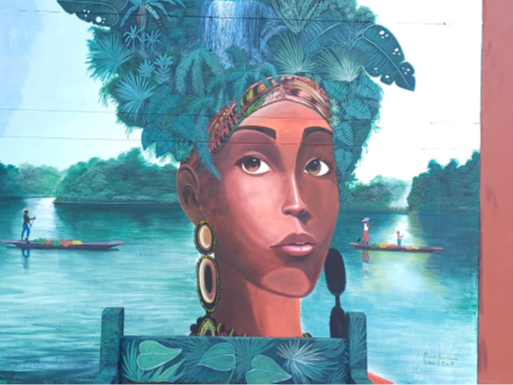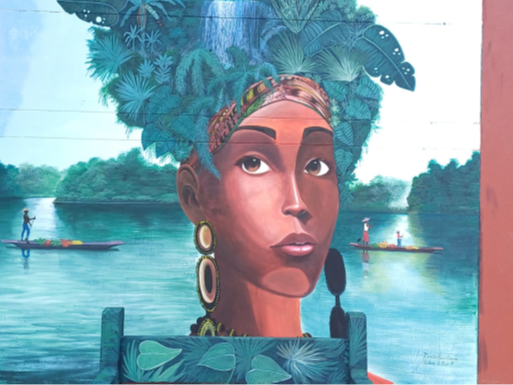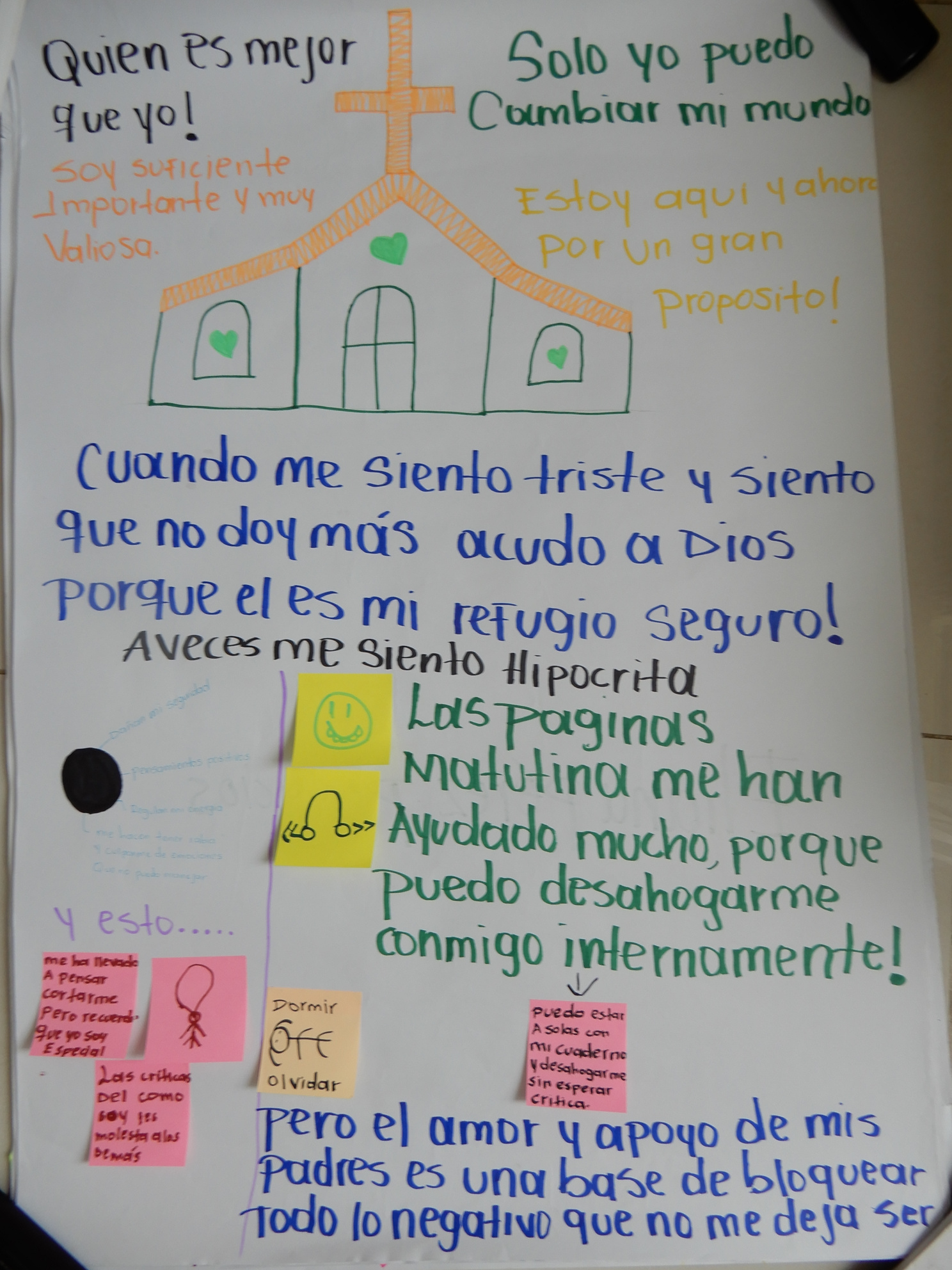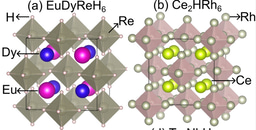Reflecting on growing up amidst violence on Colombia’s Pacific Coast this World Mental Health day - understanding young people’s support networks
Published in Social Sciences, Public Health, and Behavioural Sciences & Psychology

Why is this research valuable?
Youth mental health is the leading cause of disability and poor life outcomes for young people1. Adversity and trauma during childhood caused by conflict and violence can cause long-term mental and psychological problems. Colombia has known a decades-long internal armed conflict, which caused death and displacement. Conflict is ongoing in many parts of the country, in spite of the 2016 peace agreement. In the Pacific region, political and criminal violence is compounded by high levels of poverty and lack of opportunities for employment and education. The majority Afro-Colombian population in this region face historical racism and marginalisation.
We undertook research in the city of Quibdó in the Chocó province, one of the poorest of Colombia, with poverty levels as high as 72%. Here, we analysed what types of support young Afro-Colombian persons need to promote their mental health, which forms and systems of support are available to them and if and how these are integrated.
How did it all start? This research started as a promise between two PhD students - one from the UK working in mental health (Dr Fenton) and one from Colombia working in disability and poverty (Dr Pinilla-Roncancio) that if the opportunity to work together on a project relating to mental health in Colombia came up – they would go for it!
In 2020 an international team assembled funded by ESRC ODA Newton-Caldas Fund (UK): ES/V013297/1 and Ministerio de Ciencia, Tecnología e Innovación (Minciencias). The team included expertise ranging from gender and international peace and conflict scholars; to health with psychologists and a psychiatrist; and social and health policy scholars. This interdisciplinary group were all committed to working together to understand and map what mental health support young people in Colombia, particularly in the Pacific Region, had access to.
What was the research process like?
One of the greatest assets in this project was the interdisciplinary team. Interdisciplinarity is challenging, but it forces you to generate new knowledge because the vantage points (methodologically, epistemologically, practically, socially and emotionally) you are coming from are so varied. The greatest challenges, however, came from the context in which the work took place – one of global uncertainty because of the Covid-19 pandemic; and economic uncertainty presenting funding challenges and strain on the project. Teamwork, reflexivity and adaptability (and a lot of discussion) meant we were able to deliver the project as anticipated despite significant obstacles.
The fieldwork for this part of the study led by Dr Carranza and Dr Weber was exceptional, not just in its quality, but because of the highly difficult context in and time at which that work took place. Because of the sensitive nature of the topic and the challenges of working with young people who are less used to voicing their opinion and participating in research, we undertook participatory arts based research using a variety of methods. Through the course of our co-produced community setting based research we built two communal gardens, we painted two murals (one at a university, one in ‘el barrio’), we co-created and hosted a play with young people, and through workshops young people developed 17 ecological maps, 16 of which were shared with the research team.

So what did we find?
We found that young people were living amongst an environment of insecurity and high levels of violence, and many of those we worked with had moved to Quibdó after displacement due to conflict and violence. Some of them had lost friends and family members as a result of conflict and criminal violence. They also mentioned that displacement, insecurity and the lack of employment opportunities pushed young people into crime, creating a cycle of violence and insecurity. Culture, for instance through the use of rituals, medicinal and edible plants, served as a source of resilience and strength in this difficult situation.
Our research showed that young people in Quibdó find support mostly from friends and family. At the same time, some of the young people we worked with had no or little of family support, due to absence because of displacement, or limited emotional caregiving due to parents being preoccupied by sustaining their family in a context of poverty. Many young people find alternative individual coping mechanisms if there was no emotional support available, for instance through the use of social media, dance, rap, music, reading, sleeping or crying. Nature and being outdoors, for instance walking along the river, was also highlighted as important.
There seemed little connection between young people’s micro (close family and friends), meso (school, faith organisation, community setting, neighbourhood) and exosystems (formal mental health or healthcare services). As a result, young people feel largely isolated and unsupported. This disconnection, compounded by the stress of growing up amidst violence, poverty and insecurity, created a sense of hopelessness for young people. Our research showed the importance of safe spaces, connected to nature and outdoors activities, and to cultural and artistic practices, where young people can let off steam, find support and emotional expression
What are the implications of these findings, and what happens next?
Our research2–4 has implications for how we build and manage health systems for young people5, particularly those growing up in conflict or post-conflict contexts. Public policy should aim to better connect young people to existing mental health services. Persons trusted by young people, such as teachers or sports instructors, could play a key role in this. To facilitate such connections, the provision of community based safe spaces, like sports clubs or cultural centres are essential
Since we finished this part of the research we have applied for additional funding, and have used this to advance eco-mapping methods and create an ecological mapping tool (publication forthcoming) for use by those in communities working with young people.
We are also always looking for new ways to collaborate on improving mental health outcomes for young people in partnership with other global scholars – so if you are reading this and you are curious – please do reach out!
UK PI/Co-PI: Professor Paul Jackson p.b.jackson@bham.ac.uk, Dr Sarah-Jane Fenton s.h.fenton@bham.ac.uk
Colombia PI/Co-PI: Professor Juan Pablo Aranguren jp.aranguren@uniandes.edu.co, Dr Mónica Pinilla-Roncancio mv.pinilla@uniandes.edu.co
References:
- WEF. A Global Framework for Youth Mental Health: Investing in Future Mental Capital for Individuals, Communities and Economies. (2020).
- Fenton, S.-J. et al. Macro level system mapping of the provision of mental health services to young people living in a conflict context in Colombia. BMC Health Serv. Res. 24, 138 (2024).
- Weber, S. et al. Mapping mental health care services for children and youth population in Colombia’s Pacific: potential for boundary spanning between community and formal services. Int. J. Ment. Health Syst. 18, 9 (2024).
- Weber, S. et al. Growing up amidst violence: mapping mental health ecologies with young people on Colombia’s Pacific Coast. Confl. Health 19, 23 (2025).
- Fenton, S.-J. & Carr, S. Mental Health. in Healthcare Management, 4e (eds. Moralee, S., Sidhu, M., Smith, J. & Walshe, K.) pp 427-455 (McGraw-Hill Education, Maidenhead, UNITED KINGDOM, 2025).
Follow the Topic
-
Conflict and Health

This is a highly-accessed, open access journal documenting the public health impacts and responses related to armed conflict, humanitarian crises and forced migration.
Related Collections
With Collections, you can get published faster and increase your visibility.
Systematic Reviews in Conflict and Humanitarian Health
Armed conflict, humanitarian crises, and forced migration continue to pose profound challenges to public health systems worldwide. In these settings, evidence gaps are common, data collection is constrained by insecurity, and health needs evolve rapidly. Systematic reviews play an essential role in consolidating fragmented evidence, evaluating intervention effectiveness, and guiding policies and responses that can save lives in some of the world’s most vulnerable contexts.
This collection brings together high‑quality systematic reviews and evidence syntheses that advance understanding of the public health impacts of conflict and crises, and that evaluate strategies to improve health outcomes for affected populations. We welcome submissions addressing the full breadth of topics within Conflict and Health, including:
-Infectious disease prevention and control, outbreak preparedness, and surveillance in unstable or resource‑limited settings
-Nutrition, food security, and interventions to address undernutrition in crisis-affected populations
-Reproductive, maternal, newborn, and child health in conflict and displacement
-Sexual and gender-based violence, its determinants, and response mechanisms
-Mental health and psychosocial support, including trauma, resilience, and service delivery models
-Non-communicable diseases in humanitarian and conflict settings
-Health systems and service delivery under conditions of fragility, disruption, or deliberate attack
-Ethical considerations related to health research, intervention design, and humanitarian practice in conflict-affected communities
This collection seeks to advance both scholarship and practice by championing evidence synthesis that drives equitable, ethical, and effective health interventions in conflict and humanitarian settings.
All submissions in this collection undergo the journal’s standard peer review process. As an open access publication, this journal levies an article processing fee (details here). We recognize that many key stakeholders may not have access to such resources and are committed to supporting participation in this issue wherever resources are a barrier. For more information about what support may be available, please visit OA funding and support, or email OAfundingpolicy@springernature.com or the Editor-in-Chief.
Publishing Model: Open Access
Deadline: Nov 10, 2026
Health, Conflict and Forced Displacement: reimagining the humanitarian system
Conflict and Health welcomes invited authors to submit an article to our new series, “Health, Conflict and Forced Displacement: reimagining the humanitarian system”– a collection emerging from the work produced by the CHH-Lancet Commission on Health, Conflict and Forced Displacement.
Humanitarian crises are becoming increasingly complex, characterized by repeated violations of International Humanitarian Law and shrinking space for effective response. At the same time, opportunities exist to create a more accountable, inclusive, and effective humanitarian system. Central to this effort are approaches that place local actors at the heart of the response, allocate funding based on need, implement evidence-based interventions, and harness technology. Equally important is ensuring that the voices of affected populations, including refugees, internally displaced persons, and communities living in conflict settings, inform decision-making.
This Collection welcomes primary research, methods papers, and reviews that advance knowledge and practice in reimagining the humanitarian system. Submissions may focus on the core drivers of humanitarian action such as governance, principles, financing, and technology (including artificial intelligence), as well as cross-cutting themes such as social determinants of health in humanitarian settings, protection and health of populations in situations of particular vulnerability, and localization and equitable partnerships.
Through this Collection, we aim to bring together diverse perspectives to critically examine and strengthen the future of humanitarian action with a focus on public health, ensuring that it is more responsive, just, and centered on those most affected by conflict and displacement.
Please note that this Collection does not accept submissions from uninvited authors.
All submissions in this collection undergo the journal’s standard peer review process. Similarly, all manuscripts authored by a Guest Editor(s) will be handled by the Editor-in-Chief. As an open access publication, this journal levies an article processing fee (details here). We recognize that many key stakeholders may not have access to such resources and are committed to supporting participation in this issue wherever resources are a barrier. For more information about what support may be available, please visit OA funding and support, or email OAfundingpolicy@springernature.com or the Editor-in-Chief.
Publishing Model: Open Access
Deadline: Jul 27, 2026




Please sign in or register for FREE
If you are a registered user on Research Communities by Springer Nature, please sign in